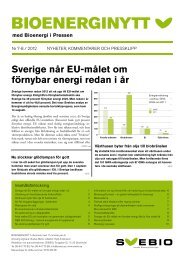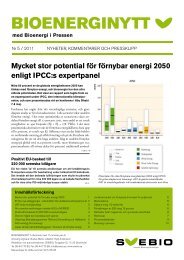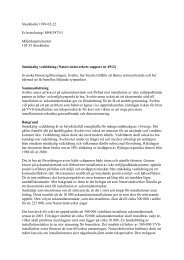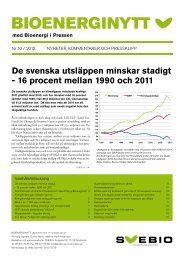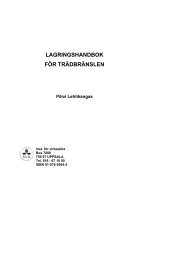Proceedings World Bioenergy 2010
Proceedings World Bioenergy 2010
Proceedings World Bioenergy 2010
Create successful ePaper yourself
Turn your PDF publications into a flip-book with our unique Google optimized e-Paper software.
The black curve is what actually has been registered, also<br />
figures from the Swedish Energy Agency. It is obvious<br />
that the ambitions are low compared to what is possible<br />
and that it is similar for other countries.<br />
3. REASONS FOR DEVELOPMENT IN SWEDEN<br />
I would like to briefly give a background of the reasons<br />
why this fairly good development has taken place in<br />
Sweden. I would also like to point out why I believe a<br />
similar development is possible and profitable in almost<br />
every country.<br />
Reasons for a good development I Sweden:<br />
3.1 No domestic fossil energy sources<br />
In the 1970-ties Sweden like most countries had more<br />
than 75 % of oil in the energy mix and also some<br />
additional percentage of coal. When the first oil crises hit<br />
the market in 1973, it became a wake up call for Swedish<br />
politicians. It became obvious that it was not clever to be<br />
so dependent on an imported energy source. Especially<br />
since price could change quickly, create unpredictable<br />
costs and ruin Swedish economy. Governmental research<br />
and investment money was at this time directed towards<br />
domestic energy production like nuclear power and<br />
renewables. At the same time it was obvious that oil and<br />
coal created environmental problems like spreading of<br />
heavy metals and acidification. Energy tax and sulphur<br />
fees were introduced on oil due to environmental reasons<br />
and to encourage use of domestic energy sources.<br />
3.2 No industry propagating for oil or coal<br />
One very important factor has been that there is no<br />
industry defending the fossil fuel position on the market.<br />
The Swedish industry has always focused on keeping a<br />
low electricity price, to be able to compete better on a<br />
global market. The Swedish government has had a<br />
similar view and increased energy taxes on households<br />
but kept taxes on an international level towards the<br />
industry.<br />
3.3 Efficient forest industry sector<br />
The Swedish forest industry sector consists of a leading<br />
pulp and paper industry as well as a large saw mill<br />
industry. The sector is very productive and consists also<br />
of a lot of different supply and manufacturing companies<br />
able to develop and manufacture forest harvesting<br />
equipment and equipment to collect and chip forest<br />
residues for energy. You are able to meet many of these<br />
companies at the exhibition here at <strong>World</strong> <strong>Bioenergy</strong>.<br />
The industry continuously has invested in increased<br />
bioenergy use and production. Investments were also<br />
enhanced by the introduction of the renewable electricity<br />
certificates in 2003 which doubles the price for<br />
renewable electricity producers. As an example of the<br />
development the pulp industry Wärö owned by Södra<br />
becomes the worlds first fossil free pulp industry in the<br />
beginning of this year. Other parts of the industry invest<br />
in production of biofuels for transport, which you are<br />
able to hear from in session D2.<br />
3.4 A common view of a free market and market<br />
conditions.<br />
Finally, the most important factor has been the<br />
politicians’ ability to create a market situation that gives<br />
companies a predictable future to invest in market<br />
opportunities they believe in. The Swedish policy has<br />
mainly been decided with the polluter pays principle in<br />
mind. We have sulphur fees, NOX-fees and from 1991<br />
also carbon dioxide tax. Taxing emissions is a<br />
predictable, logical, environmentally friendly system that<br />
companies understand. Sweden as a small country has<br />
always been dependent on international trade, and<br />
therefore it has come quite natural to develop bioenergy<br />
during free market conditions. The polluter pays principle<br />
does not give any particular advantage to any type of<br />
solution. The solutions can be energy efficiency, solar,<br />
hydro, bioenergy or something else. The most profitable<br />
solutions are chosen.<br />
world bioenergy <strong>2010</strong><br />
9




